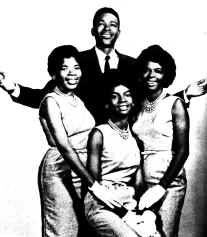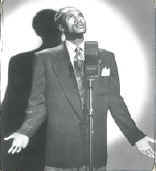Born January 8, 1935, in East Tupelo, Mississippi, Presley was the son of Gladys and Vernon Presley, a sewing machine operator and a truck driver. Presley's twin brother Jesse Garon was stillborn, and he grew up as an only child. At age three, Vernon was sent to prison for forgery. It seems that Vernon, Travis Smith, and Luther Gable changed the amount of a check from Orville Bean,Vernon's boss, from $3 to $8 and cashed it at a local bank.Vernon pled guilty and was sentenced to three years at Parchment Farms Penitentiary. Vernon's boss, Mr. Bass called in a note that Vernon signed to borrow money to build the house and Gladys is forced to move in with Vernon's parents. Vernon would only serve eight months. Afterward Vernon's employment was spotty and the family lived just above the poverty line. The Presleys attended the First Assembly of God Church whose Pentecostal services always included singing.
Jesse Garon was stillborn, and he grew up as an only child. At age three, Vernon was sent to prison for forgery. It seems that Vernon, Travis Smith, and Luther Gable changed the amount of a check from Orville Bean,Vernon's boss, from $3 to $8 and cashed it at a local bank.Vernon pled guilty and was sentenced to three years at Parchment Farms Penitentiary. Vernon's boss, Mr. Bass called in a note that Vernon signed to borrow money to build the house and Gladys is forced to move in with Vernon's parents. Vernon would only serve eight months. Afterward Vernon's employment was spotty and the family lived just above the poverty line. The Presleys attended the First Assembly of God Church whose Pentecostal services always included singing.
 Jesse Garon was stillborn, and he grew up as an only child. At age three, Vernon was sent to prison for forgery. It seems that Vernon, Travis Smith, and Luther Gable changed the amount of a check from Orville Bean,Vernon's boss, from $3 to $8 and cashed it at a local bank.Vernon pled guilty and was sentenced to three years at Parchment Farms Penitentiary. Vernon's boss, Mr. Bass called in a note that Vernon signed to borrow money to build the house and Gladys is forced to move in with Vernon's parents. Vernon would only serve eight months. Afterward Vernon's employment was spotty and the family lived just above the poverty line. The Presleys attended the First Assembly of God Church whose Pentecostal services always included singing.
Jesse Garon was stillborn, and he grew up as an only child. At age three, Vernon was sent to prison for forgery. It seems that Vernon, Travis Smith, and Luther Gable changed the amount of a check from Orville Bean,Vernon's boss, from $3 to $8 and cashed it at a local bank.Vernon pled guilty and was sentenced to three years at Parchment Farms Penitentiary. Vernon's boss, Mr. Bass called in a note that Vernon signed to borrow money to build the house and Gladys is forced to move in with Vernon's parents. Vernon would only serve eight months. Afterward Vernon's employment was spotty and the family lived just above the poverty line. The Presleys attended the First Assembly of God Church whose Pentecostal services always included singing.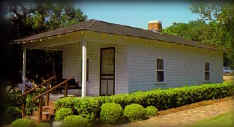
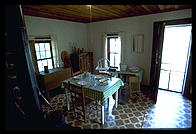
Entering the fifth grade, Presley is asked by his teacher, Oleta Grimes to enter a talent contest on children's day at the Mississippi-Alabama Fair and Dairy Show. At the age of ten, dressed in a cowboy suit, and standing on a chair to reach the microphone. Presley's rendition of Red Foley's "Old Shep" won second place, a $5 prize and a free ticket to all the rides. On his birthday the following January he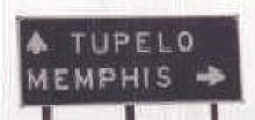 received a guitar purchased from Tupelo Hardware Store. Over the next year, Vernon's brother Johnny Smith and Assembly of Good pastor Frank Smith. gave him basic guitar lessons
received a guitar purchased from Tupelo Hardware Store. Over the next year, Vernon's brother Johnny Smith and Assembly of Good pastor Frank Smith. gave him basic guitar lessons
 received a guitar purchased from Tupelo Hardware Store. Over the next year, Vernon's brother Johnny Smith and Assembly of Good pastor Frank Smith. gave him basic guitar lessons
received a guitar purchased from Tupelo Hardware Store. Over the next year, Vernon's brother Johnny Smith and Assembly of Good pastor Frank Smith. gave him basic guitar lessonsIn 1948 after losing another job Vernon moved the family to Memphis. Glady's brothers get him a job at the Precision Tool Company and the Presleys moved into a small apartment at 370 Washington Street for $11 a week. On September 13 Elvis enrolls at L.C. Humes High School.
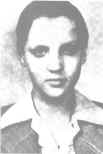
A young Elvis Presley
Starting his sophomore year Presley works in the school library and after school at Loew's State Theatre. In 1951, his receives his first driver's license, joins the ROTC unit at Humes High, tries out for the football team (he's cut by the coach when he won"t trim his sideburns and ducktail), and in his spare time hangs around the black section of town, especially on Beale Street.
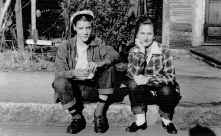
A young Elvis Presley and Betty McGann
|
|
|
In his senior year Presley gets his first car, a 1942 Lincoln Zephyr, from Vernon. At eighteen majoring in Shop, History, and English he graduates from Humes High in 1953.
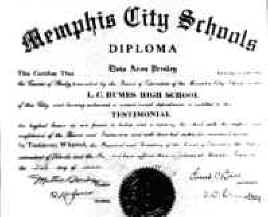
The day after graduation he took a job at Parker Machinists Shop. By June he was working at the Precision Tool Company and then drove truck for the Crown Electric Co. After a short time in the stock room he is promoted to truck driving and begins to wear his long hair pompadoured, the current truck driver style. That summer he recorded "My Happiness" and "That's When the Your Heartaches Begin" at Memphis Recording Studios, a sideline Sam Phillips had started at his Sun Records studios where anyone could record a ten inch acetate for four dollars.
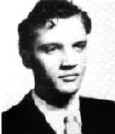
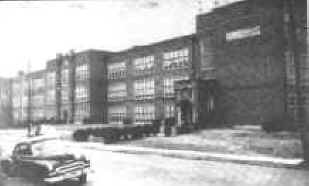
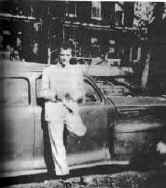
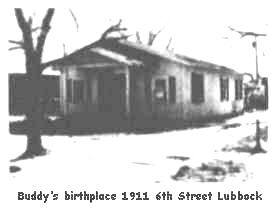
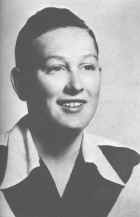
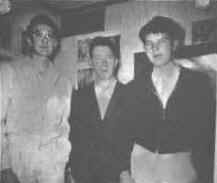
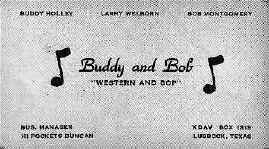
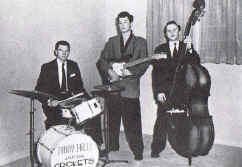
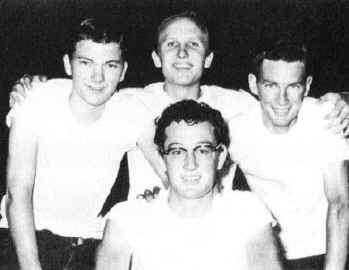
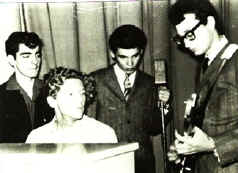
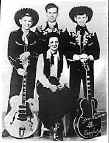 group in Muhlenberg county. Ike's guitar playing was influenced by Merle Travis, Sam McGee and other country music artists earlier in the Twentieth Century.
group in Muhlenberg county. Ike's guitar playing was influenced by Merle Travis, Sam McGee and other country music artists earlier in the Twentieth Century.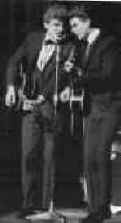 They only had one recording session with Columbia in November, 1955. Four songs were recorded but, only "The Sun Keeps Shining" b\w "Keep A' Lovin' Me" were released. There was really nothing there to set it apart from other singers from Appalachia. Only the vocals showed any promise. The little airplay that the records received was from deejays that knew the family.
They only had one recording session with Columbia in November, 1955. Four songs were recorded but, only "The Sun Keeps Shining" b\w "Keep A' Lovin' Me" were released. There was really nothing there to set it apart from other singers from Appalachia. Only the vocals showed any promise. The little airplay that the records received was from deejays that knew the family.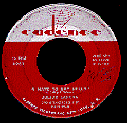
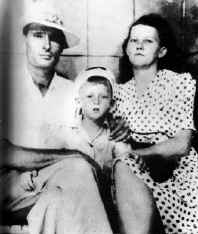
 Jerry would never escape his southern upbringing or his Assembly of God beliefs. He was taught that music to dance to came from the devil, playing in honky-tonks was sinful, drinking and carousing with women would send him to hell.
Jerry would never escape his southern upbringing or his Assembly of God beliefs. He was taught that music to dance to came from the devil, playing in honky-tonks was sinful, drinking and carousing with women would send him to hell.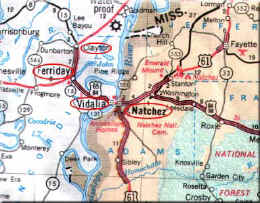

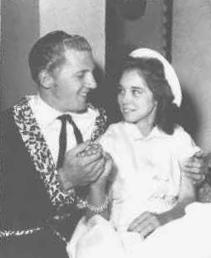
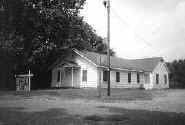
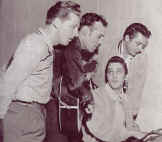
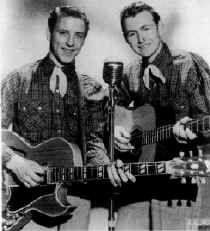 Frank Cochran's five children. At age eleven his family moved to Bell Gardens, California to join his brother Bill who had moved there when he got married after leaving the Military Service.
Frank Cochran's five children. At age eleven his family moved to Bell Gardens, California to join his brother Bill who had moved there when he got married after leaving the Military Service.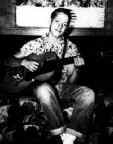 he would quit the band if he couldn't play what he wanted. He then asked his brother Bob to show him some chords on Bill's old Kay guitar. Then he got a chord book and seemed to just naturally take it from there".
he would quit the band if he couldn't play what he wanted. He then asked his brother Bob to show him some chords on Bill's old Kay guitar. Then he got a chord book and seemed to just naturally take it from there".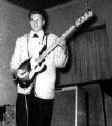 same interest in music as Eddie played upright bass in the school band and would later became his bass guitar player. In late 1953 they formed a trio together with another student on lead guitar, Connie on steel guitar and Eddie playing rhythm. They began playing country music as backup guitarists for singer Hank Cochran. Cochran began recording in 1955 with Hank Cochran (no relation) and they toured as the Cochran Brothers until 1956. After seeing Elvis Presley in Dallas in late 1955, Cochran switched to rock and roll. Cochran demonstrated his skill as a rockabilly guitarists at number of sessions in Los Angeles.
same interest in music as Eddie played upright bass in the school band and would later became his bass guitar player. In late 1953 they formed a trio together with another student on lead guitar, Connie on steel guitar and Eddie playing rhythm. They began playing country music as backup guitarists for singer Hank Cochran. Cochran began recording in 1955 with Hank Cochran (no relation) and they toured as the Cochran Brothers until 1956. After seeing Elvis Presley in Dallas in late 1955, Cochran switched to rock and roll. Cochran demonstrated his skill as a rockabilly guitarists at number of sessions in Los Angeles. Capehart who couldn't sing was looking to for someone to demo his songs. Eddie said that he and Hank would for a small fee. Shortly thereafter, they recorded three or four songs, but nothing came of these dubs. Capehart knowing he never make it as singer attempted to form a relationship with the Cochrans by using them as a backing band and offering to promote their careers. Eddie and Hank split up in 1956.
Capehart who couldn't sing was looking to for someone to demo his songs. Eddie said that he and Hank would for a small fee. Shortly thereafter, they recorded three or four songs, but nothing came of these dubs. Capehart knowing he never make it as singer attempted to form a relationship with the Cochrans by using them as a backing band and offering to promote their careers. Eddie and Hank split up in 1956.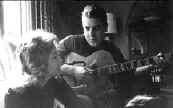
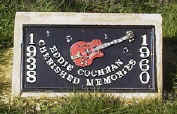
 In early 1960 he toured the United Kingdom with his girlfriend, songwriter Sharon Sheeley, and fellow superstar performer
In early 1960 he toured the United Kingdom with his girlfriend, songwriter Sharon Sheeley, and fellow superstar performer 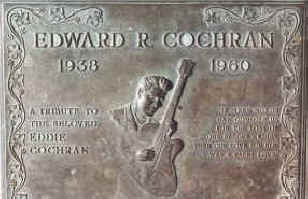
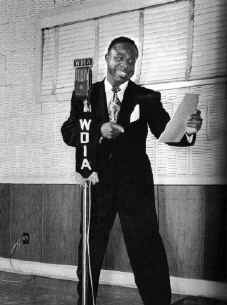
 piano, and later clarinet and alto saxophone, compose for big bands, as well as learning to read and write music in Braile. Orphaned at fifteen, Charles struck out on his own performing in bands around Florida. In 1948 at the age of seventeen Charles took his $600 savings and moved to Seattle. There he formed the Maxim trio, a group grounded in the style of Nat "King" Cole and Charles Brown. The Maxim Trio had a major R&B hit in 1949 with "Confession Blues" on the Downbeat (later Swing Time) label. It was during this time that he first began using Heroin. Charles toured with blues artist Lowell Fulson in the early '50s, having R&B hits with "Baby Let Me Hold Your Hand" and "Kiss Me Baby" on the small Los Angeles based Swingtime Label.
piano, and later clarinet and alto saxophone, compose for big bands, as well as learning to read and write music in Braile. Orphaned at fifteen, Charles struck out on his own performing in bands around Florida. In 1948 at the age of seventeen Charles took his $600 savings and moved to Seattle. There he formed the Maxim trio, a group grounded in the style of Nat "King" Cole and Charles Brown. The Maxim Trio had a major R&B hit in 1949 with "Confession Blues" on the Downbeat (later Swing Time) label. It was during this time that he first began using Heroin. Charles toured with blues artist Lowell Fulson in the early '50s, having R&B hits with "Baby Let Me Hold Your Hand" and "Kiss Me Baby" on the small Los Angeles based Swingtime Label. he arranged and played piano on Guitar Slim's top R&B hit "The Things I Used to Do" for Specialty Records and formed his own band. In 1955 Charles had a hit in both the R&B and pop fields with his own composition "I've Got a Woman." Using top flight studio musicians Charles had hits consistently on the R&B charts through the late '50s with "A Fool for You," "Drown In My Own Tears," :Hallelujah I Love Her So," and "Lonely Avenue," The recording debut of his female backup group the Raelettes. He also became popular with jazz fans, recording two highly acclaimed records and performing a set at the 1958 Newport Jazz festival in 1959. Charles established himself as a popular recording artist and a pioneer of soul music with the release of his own top R&B/pop hit
he arranged and played piano on Guitar Slim's top R&B hit "The Things I Used to Do" for Specialty Records and formed his own band. In 1955 Charles had a hit in both the R&B and pop fields with his own composition "I've Got a Woman." Using top flight studio musicians Charles had hits consistently on the R&B charts through the late '50s with "A Fool for You," "Drown In My Own Tears," :Hallelujah I Love Her So," and "Lonely Avenue," The recording debut of his female backup group the Raelettes. He also became popular with jazz fans, recording two highly acclaimed records and performing a set at the 1958 Newport Jazz festival in 1959. Charles established himself as a popular recording artist and a pioneer of soul music with the release of his own top R&B/pop hit composition "What I Say."
composition "What I Say." volume two was released and had crossover hits "You Are My Sunshine," "Your Cheating Heart," and "Take These Chains From My Heart." On ABC Charles had major pop hits with "Busted," "That Lucky Old Sun," "Crying Time," and "Together Again."
volume two was released and had crossover hits "You Are My Sunshine," "Your Cheating Heart," and "Take These Chains From My Heart." On ABC Charles had major pop hits with "Busted," "That Lucky Old Sun," "Crying Time," and "Together Again." You," featuring himself and Chaka Khan. In the '90s Charles appeared in commercials for Pepsi and was the subject of a PBS documentary.
You," featuring himself and Chaka Khan. In the '90s Charles appeared in commercials for Pepsi and was the subject of a PBS documentary.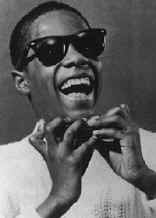 Harmonica Man," "Work Out Stevie, Work Out," and "Contract On Love" to name a few. In 1964 Wonder dropped the "Little" appellation. His late teen years saw continued success with "Uptight (Everything's Alright)," " For Once in My Life," "My Cherie Amour," and "Signed, Sealed, Delivered I'm Yours." Throughout this period Stevie worked on improving his skills as a singer, keyboardist, songwriter, and producer. In fact, he co-wrote most of his singles from 1967 onward, as well as the
Harmonica Man," "Work Out Stevie, Work Out," and "Contract On Love" to name a few. In 1964 Wonder dropped the "Little" appellation. His late teen years saw continued success with "Uptight (Everything's Alright)," " For Once in My Life," "My Cherie Amour," and "Signed, Sealed, Delivered I'm Yours." Throughout this period Stevie worked on improving his skills as a singer, keyboardist, songwriter, and producer. In fact, he co-wrote most of his singles from 1967 onward, as well as the 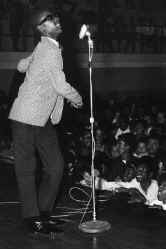 fund, he invested in his own publishing (Black Bull Music) and recording studio, Taurus Productions, ( where he could finance his own recordings. Stevie also took some music theory classes at USC to improve his song writing capabilities. Stevie recorded two albums on his own ( Where I'm Coming From and Music of My Mind) with the programming aid of Robert Margouleff and Malcolm Cecil. Margouleff and Cecil helped Stevie pioneer the use of synthesizers in popular music (most notably in Music of My Mind.) With these two albums, Stevie negotiated a contract with Motown that allowed him more freedom in artistic matters and a higher royalty percentage. Such a contract was nearly unheard of then, since Motown had a reputation of being merely a hit-making machine with little variety. Once the new contract was signed, Stevie released the two albums. Although the albums were not huge successes, Stevie showed signs of the genius that was about to come.
fund, he invested in his own publishing (Black Bull Music) and recording studio, Taurus Productions, ( where he could finance his own recordings. Stevie also took some music theory classes at USC to improve his song writing capabilities. Stevie recorded two albums on his own ( Where I'm Coming From and Music of My Mind) with the programming aid of Robert Margouleff and Malcolm Cecil. Margouleff and Cecil helped Stevie pioneer the use of synthesizers in popular music (most notably in Music of My Mind.) With these two albums, Stevie negotiated a contract with Motown that allowed him more freedom in artistic matters and a higher royalty percentage. Such a contract was nearly unheard of then, since Motown had a reputation of being merely a hit-making machine with little variety. Once the new contract was signed, Stevie released the two albums. Although the albums were not huge successes, Stevie showed signs of the genius that was about to come.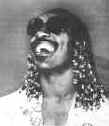 released within the next year. This period was difficult for Wonder with his marriage to Wright ending after only a year. Injuries sustained in a serious car crash in 1973 left him in a coma for four days and a lost sense of smell. In the next four years, Wonder had three #1
released within the next year. This period was difficult for Wonder with his marriage to Wright ending after only a year. Injuries sustained in a serious car crash in 1973 left him in a coma for four days and a lost sense of smell. In the next four years, Wonder had three #1 singles("You Haven't Done Nothin'", "I Wish", and "Sir Duke"), sold millions of each, and received 15 Grammies. His songs were covered widely and he was acknowledged as an influence on musicians from Jeff Beck to George Benson to Bob Marley. Working with
singles("You Haven't Done Nothin'", "I Wish", and "Sir Duke"), sold millions of each, and received 15 Grammies. His songs were covered widely and he was acknowledged as an influence on musicians from Jeff Beck to George Benson to Bob Marley. Working with 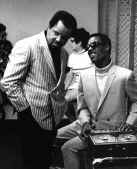 through chart-wise with two number one hits, the funky "Superstition" and the now standard "You are the Sunshine of My Life." The album was a big hit with the public. The power and emotion of the album in many ways shone true because many of the songs ("Blame It on the Sun," " Looking For a New Love," " I Believe") were written in reference to the relationship with his wife and former musical partner Syretta Wright. The programming of Margouleff and Cecil helped to represent these feelings in an all new manner.
through chart-wise with two number one hits, the funky "Superstition" and the now standard "You are the Sunshine of My Life." The album was a big hit with the public. The power and emotion of the album in many ways shone true because many of the songs ("Blame It on the Sun," " Looking For a New Love," " I Believe") were written in reference to the relationship with his wife and former musical partner Syretta Wright. The programming of Margouleff and Cecil helped to represent these feelings in an all new manner.